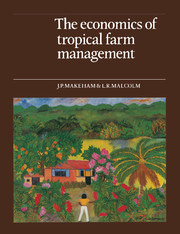Book contents
- Frontmatter
- Contents
- Preface
- Acknowledgements
- 1 Introduction
- 2 Farm management
- 3 Farm analysis and planning
- 4 Principles of production
- 5 Costs and returns
- 6 Farm profits, financial statements and records
- 7 Cash flows
- 8 Gross margins
- 9 Time is money
- 10 Planning changes
- 11 Cropping
- 12 Animals
- 13 Mechanisation
- 14 Farm development
- 15 Farm credit and finance
- 16 Beyond the farm
- Appendix 1 Interest rate tables
- Appendix 2 Metric conversion
- Glossary
- Index
12 - Animals
Published online by Cambridge University Press: 12 October 2018
- Frontmatter
- Contents
- Preface
- Acknowledgements
- 1 Introduction
- 2 Farm management
- 3 Farm analysis and planning
- 4 Principles of production
- 5 Costs and returns
- 6 Farm profits, financial statements and records
- 7 Cash flows
- 8 Gross margins
- 9 Time is money
- 10 Planning changes
- 11 Cropping
- 12 Animals
- 13 Mechanisation
- 14 Farm development
- 15 Farm credit and finance
- 16 Beyond the farm
- Appendix 1 Interest rate tables
- Appendix 2 Metric conversion
- Glossary
- Index
Summary
Introduction
Why do farmers in the tropics keep animals? Because animals supply one or more of the following products or services: meat, milk, eggs, fibre (hair and wool), blood and urine, skins and leather, traction and transport, dung, prestige, assets and security in a negotiable form, social and cultural services (e.g. bride price payment); and/or because farmers like them. H. R. Jahnke, in his text Livestock Production Systems and Livestock Development in Tropical A/rica, published by Kieler Wissenschaftsverlag Vauk in 1982, says that animals perform four functions:
(i) output;
(ii) input;
(iii) asset and security;
(iv) social and cultural.
As output, animals provide food and non-food products for subsistence consumption, cash income from sales, and a means of helping the family to get a balanced, more interesting, diet. The inputs animals provide include farm work and transport, manure, and they can have an integrating function, e.g. using nonarable land within the farm, using otherwise (seasonally) unemployed labour, and converting low-value crop residues to high-value animal products.
Animals have an asset and security function by providing a tradable asset, whereas land often cannot be sold because it belongs to the group or clan. Banks are often neither available nearby nor trusted, but livestock is regarded as a relatively safe and durable means of storing private wealth, which earns ‘interest' because it produces offspring each year. The social and cultural function goes past the straight economics of production. For example, the bride price may be payable only in cattle; the camel can be valued for racing ability, not its milk or hair production; a person's, or family's social status can be related to numbers, species and quality of stock owned. Animal-feeding systems in the tropics range from nomadic grazing of rangelands, through ranching systems where the animals are not moved from their home farm, to integrated crop-livestock farming, and finally to ‘factory’ farms.
The methods of husbandry of animals in the tropics also vary greatly. At the simplest level of animal production, there is the semi-subsistence household with small numbers of a few species (kept mainly for domestic, not commercial, use). For example, there may be some chickens or ducks, two or three sheep or goats, a pig or two, a growing crocodile, a cow or camel for milk, a horse or donkey for transport, a buffalo or ox for field work and usually a dog for company and protection.
- Type
- Chapter
- Information
- The Economics of Tropical Farm Management , pp. 115 - 126Publisher: Cambridge University PressPrint publication year: 1985



